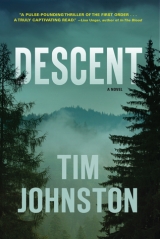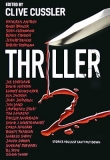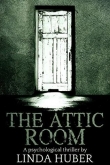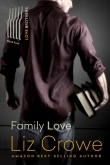
Текст книги "Descent"
Автор книги: Tim Johnston
Жанр:
Триллеры
сообщить о нарушении
Текущая страница: 24 (всего у книги 25 страниц)
68
He could not speak but only stood there, hunched over her, careful of the tubes and wires and the incredible thinness of her under the bedding. His jaw was pressed to her wet neck, and she trembled with the quaking of his body. There was no sound in the room but the chirping of the machines and the soft patting of her hand on his back and her reedy voice saying It’s okay now, Daddy, it’s okay, it’s okay, Daddy.
She opened her eyes again, the pupils so large and black even in that light, and Sean, standing back from the bed, tried to hold her gaze, but he could not and he looked instead to the floor.
“Dudley,” she said, just audibly, and he looked up and she was smiling at him over their father’s shoulder. She said something more he didn’t hear and he stepped forward and she swallowed and said in her drugged whisper, “I knew you were alive.”
SHE SLEPT AGAIN AND they stood looking down on her. Grant reached to draw a strand of hair from her face, passed his knuckles softly over her cheek, her chin. Then he turned to his son: “I’ll call your mother now. Are you all right?”
When he was gone, Sean stepped closer to the bed. He took up her limp hand. He looked at her feet: the tented shape of the left foot under the bedding and the footless right in its enormous white wrappings, like a swaddled child. When he looked at her face again her eyes were open. Wet and glazed and looking at him.
“So tall,” she said.
She looked beyond him to the closed door, and before she could ask he told her that she wasn’t here, that she was still back home, in Wisconsin. “We wanted to see you before we called her,” he said.
“Is she all right?”
“Yes.”
She studied him. “Do I look as old as you?”
“You look just the same.”
“Bullshit.”
She saw the cast and puzzled at it. “What happened to your hand?”
“It got in a fight.”
“With who?”
“The wrong man.”
She stared at him. Then she looked beyond him again toward the door, and he turned to look but there was no one there.
“Are they still . . . ?” she said.
He nodded.
The machines beeped and hummed. He looked around at their mysterious faces. When he came back to her, some fresh wave of pain was in her eyes and she said, “Sean, I’m so sorry.”
He shook his head.
“I never should have left you,” she said. “I’m so sorry.”
“Don’t,” he said.
“I was supposed to take care of you—”
“No,” he said.
“And I left you there.”
Her lids faltered and the grip drained from her hand. “But you stayed,” she said. “You stayed, all this time.”
Next she knew, the world was in motion—walls and ceiling panels and lights all sliding by in a lurid hallucinatory blur. Then she saw her father beside the bed and the sight of him walking and the feel of his hand around hers told her it was not the world in motion but herself.
The small woman doctor walked ahead of him. Her brother walked on the other side of the bed and a man she didn’t recognize was pushing the bed. A bag of clear fluid swung from a chromium hook.
She squeezed her father’s hand and he looked down and his haggard face reset itself.
“Hey there, sleepyhead.”
“Where we going, Daddy?”
“Down to Denver, sweetheart, to see another doctor.”
“Will Mom be there?”
“Not right away but soon.”
He smiled and she said in sudden desperation, “I wanted to call you but they took my phone away and wouldn’t give it back!”
“It’s all right, sweetheart. We’re here now.”
“But I wanted to call you and they took my phone away. Why’d they take my phone away, Daddy?”
The woman doctor with the pretty face smiled and said, “It was the sheriff’s phone, honey, remember?”
They passed through the parting glass doors and into the harsh outdoor lights of the stone canopy. Beyond the canopy the mountains and the ski runs and the sky were all blue-gray in the coming dawn and she felt the cold air and saw the sky and began at once to weep.
“Billy,” she said.
“Shh,” said Grant.
“Daddy,” she said.
“Yes, Caitydid.”
She closed her eyes and Grant touched her face.
“I’m so sorry,” she said.
“Hush,” he said.
“He found me, Daddy.”
“I know, baby.”
“He stabbed the Monkey.”
Grant and Sean looked at each other.
“He stabbed the Monkey,” she wept, “and I chopped off his foot.”
The EMTs took command of the gurney, buckling the legs and rolling it into the ambulance all in one motion. Grant shook the doctor’s hand a final time and thanked her and she told him again that Caitlin was going to be just fine, that she had never met a stronger young woman nor a braver one.
She stepped away and the sheriff came forward.
“I just got off the radio with my deputy,” he said. “They found him.”
“Alive?”
“No, sir, he’s as dead as they come. The dogs found him sitting under a tree with a bowie knife stuck in his neck. His own, from the looks of it.”
“Billy,” Grant said.
“That’s how it looks.” Kinney adjusted his belt. “Dogs also found a hole up there.”
“A hole.”
“A kind of pit. In the rocks. Deep. Looks like he was trying to put Billy down there when he got that knife stuck in his neck. Then he crawled away and died and Billy went back to the cabin. How it looks.”
“So he’s dead,” Grant said.
“Dead and gone to hell.”
The EMT had his hand on the ambulance door. The sheriff didn’t move.
“What else?” Grant said.
“Bodies. Down in that pit. At least two. We won’t know how many till morning.”
Grant nodded.
“I can take you up there, if you want,” said Kinney. “After you get Caitlin settled down in Denver. If you want to see that shack. That man. I figure it’s your right.”
Grant looked into the ambulance. He shook his head. “I’ve already seen it, Joe.”
He climbed in and sat beside his daughter and found her hand, and the EMT shut the door and the ambulance pulled away with the colored lights flashing but no siren, and when they passed through the parking lot Sean put the blue Chevy in gear and fell in behind them and he stayed behind them all the way down to the city.
69
She dreamed that night of a house in the woods. They were not the woods of the mountains that went on and on like the sea, but a small woods, and through the trees she could see the sun on the lake, a rich, wobbling yolk of deep yellow, and the windows of the house, which was no house she recognized, were struck with the same rich light, as if the house had been designed, oriented, to blaze in just this way at just this hour of every day, like the cathedrals of Europe. A woman sat on the porch steps waiting, a woman no older than herself, and at her approach the woman stood and smiled and drew the hair from her forehead in a certain way, and love flooded into
Angela’s heart as her young mother took her into her arms and held her and kissed her and said, Angela, my love.
Mom, what are you doing here, where’s Daddy?
Daddy isn’t here, sweetheart, but Faith is.
Faith’s here? Where?
Inside, inside.They’re all inside, and Angela’s heart grew faint. All?
And the door swung open and within was a vast room like a ballroom, and everywhere she looked there were girls, young women, all in marvelous clothes, the loveliest dresses—slender modern girls dressed for someone’s wedding, or graduation, their smiles, their eyes catching the light, their faces open and luminous—so many faces! She looked and looked and at last she saw her own face among them, her own smile, and Faith came running into her arms, and they kissed the tears from one another’s cheeks . . . and happy as she was in this dream of reunion Angela was uneasy, her stomach like a fist—there were too many girls, and taking Faith’s hand she moved more deeply into the room, and there were many girls she knew by name and many she did not and her heart was pounding and her legs were unsteady. They were nearing the back of the vast room, nearing windows full of the dying light of sundown, when at last she whispered, Is she—? Faith, is she—?
And Faith smiled and said, Don’t stop, Angie, keep looking.
Hair of every shade, thick, shining hair of youth and she saw a ponytail like walnut silk, and she could not breathe—but it wasn’t her. And here was another girl, and another, all of them so young, so full of love, and none of them Caitlin, and she awoke then in sobs, swimming in the scents of hair, of warm smooth faces and of kisses, saturated in them, and her palms were full of the most incredible—“Smell, smell!” she demanded, but the arms that held her were not a sister’s, not a daughter’s. “It’s all right,” he was saying. “It’s all right, Angie, it was just a dream.” But he didn’t understand, he didn’t understand how she had loved them, all of them, his arms so thick and muscled and hard in the spinning, fragrant dark.
THIRTY, PERHAPS FORTY MINUTES later, as she was falling asleep again, her phone began to rattle on the tabletop, and Angela freed herself from him and groped and found it and lifted the blue light to her face thinking, Grace, oh God, you forgot to call Grace . . . but it wasn’t Grace.
70
When they reached the clinic Dr. Wieland was in surgery and Caitlin was set upon by a swarm of purple-clad nurses and orderlies who moved and spoke and touched like a single entity whose only purpose was to reassure and calm the hearts of all who came before them. Grant and Sean were diverted to a small waiting room where three oversized leather chairs sat around a well-made walnut coffee table. A sweating pitcher of water, a hot pot of coffee on the table. Living plants in festive Mexican flowerpots. They were alone in the room and they knew without being told that no one else would come into the room unless it was one of the nurses or orderlies in purple scrubs or the doctor himself.
They had been in the room fifteen minutes, according to the wall clock, when there was a knock at the door and a young man stepped in to tell them that the doctor would be in surgery with another patient for a little while longer and to ask if there was anything they needed. They both wanted to say an ashtray but didn’t. Fifteen minutes later the same young man returned to say that the doctor had finished with his surgery and was now with Caitlin and he would come talk to them soon.
Grant looked at the wall clock and he looked at his watch and he went to the window and looked out on the city in the early light. He remembered standing at another window on another morning, his naked wife behind him. Naked for the last time. His for the last time.
“She’ll be landing in half an hour,” he said. “And it’ll take about that long to get to the airport.”
Sean poured more coffee. “What did she say?”
“What did she say?”
“When you called.”
Grant thought but couldn’t remember. He’d made the call in a dream, unable to believe what he was doing, what he was saying. What did you say to a mother who believed her child was dead? How did you break that news? She’s alive? We found her? We have her? Or were those the sheriff’s words
to him?
He met his son’s eyes and shook his head. “I don’t remember.”
They were quiet. The wall clock ticked. At last, with a sharp stab of pain in his knee, Sean pushed up from the chair and opened the door.
“Sean.”
He turned back.
“I’ll tell her . . . the rest,” Grant said. “I’ll do that.”
Ten minutes later, with a brisk rap for warning, the door opened and a tall man in purple scrubs and a white doctor’s coat walked in and introduced himself as Dr. Wieland. Grant looked for blood on the white coat and saw not one spot. The doctor was silver-haired and slightly stooped in the way of tall old men although he was not so old and his hand as the two men shook was alive and strong and did not let go of Grant’s but instead kept hold of it, turning it over to see what his fingers had felt.
“Not bad, not bad,” he said, reading the old suture scars with his thumb. “Are you a carpenter, Mr. Courtland?” The thick and laconic drawl was somehow at odds with the purple scrubs and the keen eyes and the strong antiseptic smell of him. In his other hand he held something, which at a glance appeared to be a human foot, absently carried away from the operating room.
“A poor one,” said Grant.
“Not as poor as some. I’ve seen men who didn’t know better than to stop at two fingers but came in with all four in a sandwich bag. Table saw?”
“Yes.”
The doctor nodded. He released Grant’s hand. “Was there no chance of replanting?”
“Replanting?”
“Reattachment.”
“I forgot them. I’d been drinking.”
“Ah,” said the doctor. “Please, sit,” he said, and they lowered into the deep laps of the chairs with the coffee table between them. The doctor paying no mind to the thing in his hands.
“I saw a young man once who’d cut off his hand with a circular saw. One of those powerful ones—what are they called?”
“Worm drive.”
“Yes. A worm drive. The saw kicked back as such saws are inclined to do, I’m told, and severed his free hand cleanly at the wrist. In his panic, or whatever it was that ruled his thinking, he did not apply a tourniquet but instead plunged his wrist into the fireplace, much as Caitlin has done.” The doctor shook his head. “Remarkable, the human will,” he said. “This young man then drove himself and the severed hand to the hospital, where I told him I could replant the hand but that because of the burning I would have to shorten the forearm a bit, and do you know what the young man said? He said, I ain’t gonna be no short-armed freak, doc. Throw that hand out and let’s get on with it.”
The doctor sat smiling pleasantly.
“How is my daughter, Dr. Wieland?”
The doctor’s face grew serious, though his eyes shone brightly. “She is wonderful, Mr. Courtland, she is wonderful. The entire staff is in love with her.”
“What about her foot?” said Grant.
“I understand we do not have the foot.”
“Her leg, I mean,” said Grant.
“It’s a pity we don’t have the foot. I’d have liked to see the incision, even if there was no hope of replanting.” He now regarded the foot in his hand. They both did. It was a plastic anatomical model, the bones and sinews all exposed in their grisly articulations.
“Because of the burning?” said Grant.
“That’s right.”
He searched the doctor’s face. “And if she’d used a tourniquet instead?”
The doctor stared at him, smiling faintly. “As I understand it, Mr. Courtland, Caitlin expected to be going down the mountain on her own two feet—as it were. Is that not correct?”
“That’s correct.”
“That’s why she cut off her foot in the first place, is it not? Because as far as she knew that was her only hope?”
“Yes.”
“Well. I have operated on the toughest young men and women you will ever know, and if any one of them had told me they’d performed such a feat as walking down a mountain with one foot severed and managing a tourniquet all the while, I’d have said it was nothing but the morphine talking.”
Grant had no response.
“No, Mr. Courtland. Your daughter did what she believed she had to do to get down the mountain. A tourniquet? No, sir. She never would have made it.”
He peered at Grant and began shaking his head again. “Remarkable,” he said.
“Will you have to shorten her leg?” Grant said.
The doctor was staring at the plastic foot. “No, I don’t believe so. But I have to ask, Mr. Courtland—has your daughter any interest in medicine? As a practice and science, I mean?”
“Not that I know of.”
“No special interest in podiatry? In surgical technique?”
“Not that I know of. Why?”
“Remarkable,” said the doctor, then was silent.
Grant watched him. “What’s remarkable, doctor?”
“All of it,” he said. “But most especially the disarticulation itself.”
“The disarticulation?”
“The cut, the cut. With an ax, no less. If I didn’t know better, Mr.
Courtland, I’d say Caitlin consulted with Dr. Syme himself before she picked up that ax.” Then, using the plastic foot for reference, he explained the particulars of the Syme’s procedure. He spoke of the disarticulation of the ankle joint and the resection of the malleoli and of the removal of the calcaneus by subperiosteal dissection, and as he spoke, his slow-moving drawl was gradually overtaken by a narrative of escalating passion, as though the very language of surgery caused in him a kind of unmanageable excitement. As though he’d taken Grant with his missing fingers as a fellow enthusiast of the amputation arts.
“Caitlin’s disarticulation is beautiful,” the doctor said. He smiled, his eyes catching the light. Then, sobering, he admitted that there was, however, a good deal of soft-tissue trauma that would require some complicated grafting, which would slow down her healing.
“But she is strong, by God,” he said, “and I’ll tell you something else, Mr. Courtland: in about six months, when she gets one of these Flex-Symes carbon running feet under her, she’ll wish she’d lost both feet.”
Grant stared at him. “Did she tell you that?”
“Tell me what?”
“That she’s a runner.”
The doctor looked at him, puzzled.
“I’m told your daughter brought only two things down with her from the mountain, other than the clothes on her back,” the doctor said. “Is that not correct?”
Grant didn’t understand.
“May I?” said the doctor, and he leaned over the coffee table and picked up the white plastic bag that sat near Grant’s feet and had been sitting there all that time. Grant looked at it and wondered who had given it to him and when. The doctor loosened the plastic drawstring and reached in and peeled the bag away from a pair of running shoes. They had once been pink and white, and one of them, the left, was shaped and cleaned by its recent usage in the snow while the other was dingy and stiff, and the moment he saw them Grant took them from the doctor and held them in his hands and wept.
71
Sean was inside the terminal on time, but his mother’s plane was delayed and he passed the time wandering with his limp and his cast in the massive weave of travelers, until finally he took refuge in a small shop. He pretended to browse the magazines, then bought a toothbrush and a small tube of toothpaste and went to the men’s room where he stood brushing his teeth and washing his face and running his dripping fingers through his hair. The face he saw in the mirror looked old and foreign to him. Men came and went. After a few minutes he threw away the toothbrush and the small tube and went back to the terminal corridors to wait for her.
He didn’t see her at first among the passengers emerging from the security exit. He saw a woman he mistook for her, looked past her, and looked back and it was her. She saw him at once and walked over to him with her red eyes brimming. She was older and somehow smaller and her blonde hair was styled in an unfamiliar way and within it were new streaks of white. She stood looking him over and shaking her head and saying nothing. She raised her hand to his face and swept her thumb over his dry cheekbone as though to wipe away a tear.
“Is your father with you?”
“No, he’s with Caitlin,” he said, and at this sentence her face fell and she reached for him and held him while passengers dodged all around them. He could not remember the last time they’d embraced, but it seemed he’d been a boy then, reaching up to her from far below.
When she released him her face was wet but composed. He took the small bag from her shoulder and hung it on his. She asked was it a long drive to the clinic and he said no, not long, and they turned and began to walk. Soon they were on the highway in the Chevy, driving back into the city, back
into the west, as they’d done long ago, toward those same formations looming so incredibly in the sky.
At the clinic, at the first sight of her aged and joy-wrecked mother, Caitlin knew her better than she’d ever known her before, seeing in her eyes nothing of what she herself had gone through but only the full and terrible love of a mother for the child who came from her and was part of her and was all of her and the loss of whom could not be borne.
72
The funeral was held on a damp and chill Thursday morning. It was only ten days since the old man had been buried here, but now the last of winter had been washed away by the rains, and the grass was coming in pale green and tender over his grave.
There had been no formal service—Sheriff Kinney had seen enough of the press and other gawkers and wanted only to get his brother laid to rest and for all of this business to be behind them, although he knew it never would be, and those who attended the burial had received a call from him the day before, when the time and day had at last been set. Among the mourners were the Gatskill girl, wearing the same black dress she’d worn ten days ago; the old veterinarian, Dale Struthers, and his wife, Evelyn; Maria Valente and her daughter, Carmen; the sheriff’s two deputies and their wives, and
Kinney’s own wife and his daughter, Josephine, who’d driven down from Boulder again and who was unable to keep her eyes from the Courtland girl, so thin and quiet in her wheelchair, so pale in her dark dress and dark hair, her eyes gazing into the distance while the pastor spoke graveside once more, committing on behalf of those gathered this soul to God’s keeping. The breeze took up his words and carried them along over the graves and into the far border of trees where the crows sat in the boughs watching.
The casket descended mechanically into the earth and a few flowers were cast down onto its black enamel hood and Denise Gatskill dropped some small unseen thing that rang lightly along the curve of the lid and fell down into the dark. Then she was led away in the care of another young woman and a young man who, like her, had nothing more to say to anyone there.
One by one the remaining mourners turned from the grave and shook the sheriff’s hand again or embraced him, and then moved on to the Courtlands and the girl in the wheelchair, the men nodding to the girl and patting her stiffly on the shoulder, the women bending to press their faces wetly to hers. They shook hands with Grant and Sean and Angela, and as there were no words for what they felt they said none and moved on, some to pay respect to other graves, the rest returning to their cars.
Kinney lacked the heart to open up the ranch house again and instead the mourners were invited to the Whistlestop Cafe, where Tom Hicks was preparing a brunch buffet, and for this reason Maria Valente and her daughter were brief with their respects, Maria saying as she held Angela’s hand that she hoped she would see her again at the cafe and then turning from Grant Courtland and his family and walking away hand in hand with her daughter. At their car the girl stopped and looked back, and Sean, holding his tie down against the wind, went to her. Maria slipped into the car, and Sean and Carmen stood talking for just a moment. Then she raised up on her toes to kiss his cheek, and he turned and came back, head down, refusing to meet his sister’s eyes or to acknowledge in any way her sly smile.
Kinney walked the old pastor to his car for the chance to press a fold of bills into his hand, but the pastor would not take the money, as he had not taken it when he’d buried the sheriff’s mother, and then the sheriff’s father, who had been members of his parish. On his way back Kinney stopped behind an iron bench and lit a cigarette, and after a moment Grant walked over to join him. Kinney shook another cigarette up from the pack and Grant looked as though he would take it but then didn’t.
“Told myself I’d quit,” he said.
“You can quit some other day.”
He took the cigarette and leaned toward the sheriff’s cupped hands, and they stood smoking, watching the small huddle of their families in their dark clothes, all standing but one.
“How’s she coming along?” said the sheriff.
“Healing fast, the doctor says.”
“I ain’t surprised.”
“I appreciate you putting this off like you did, Joe. We all do.”
Kinney waved this away.
Grant read the inscription again on Emmet and Alice’s shared stone, and he read the new stone already in place: WILLIAM MICHAEL KINNEY, BELOVED SON AND BROTHER.
“I don’t know how else to put it,” he said, “but I wish your dad had lived to see this.”
Kenny nodded. “I do too.”
“My last words to him weren’t very kind ones,” Grant said. “To Billy. I would like to have them back.”
Kinney blew a stream of smoke. “Mine weren’t either, Grant. He didn’t go out of his way to bring out the best in people.”
“Well,” said Grant. “I’m not likely to remember that part.”
They smoked. They watched their families, each one of whom glanced in turn to see that the men were still there behind the bench, still smoking. As the wives talked and the men looked on, Caitlin slipped her hand into the sheriff’s daughter’s hand and without looking at her simply held it.
“I guess she didn’t get to them other funerals, then,” Kinney said. “Them two girls and that other man, the hiker.”
“No. But the families came to see her at the clinic. The girls’ families.” Grant looked away and drew on the cigarette. “I’ll tell you, Joe, it reminded me of when she’d win a race, and the parents of the other girls would come over to shake her hand, hug her.”
Kinney flicked the ash from his cigarette. He peered into the gray sky.
“They ever find any family of that man?” Grant said after a moment.
“Not much. Both his folks are dead. They found his old granny in a nursing home in Sterling but she didn’t hardly know her own name so they just let her be.”
Grant stared into the distance. Then he said: “I’d have killed him if I had a chance, Joe. You know that?”
“I know it.”
“I pictured it a thousand times. Walking up to him with your dad’s shotgun, putting it in his face. I wouldn’t have cared what happened to me.”
The sheriff looked down at his boots.
“I had the TV on this morning at the motel,” Grant said. “And they were talking about a little girl nine years old got taken by some man down in, I don’t remember the name. It wasn’t too far from here.”
“Pueblo.”
“Pueblo. Yes. Little thing got away when the man’s van broke down and he took her into a 7-Eleven and she started screaming.”
“Brave little girl.”
“Yes,” Grant said. “But say that van didn’t break down, Joe?”
“Well,” said Kinney. “I guess some would say God was looking out for her.”
“Is that what you’d say?”
Kinney looked out over the stones. “Some days I would,” he said.
Grant nodded. He said, “Sometimes I wonder if I didn’t make a mistake, not seeing him for myself, that man. His body. Seeing it with my own eyes. I wake up sometimes and I know he’s not dead. That he fooled everybody and he’s out there still.”
Kinney looked at him until he looked over. “That was some other man took that little girl, Grant. I can by God guarantee it.”
“I know it, Joe. I know it. But it’s no comfort.”
At the cars Kinney leaned down so Caitlin could put her arms around him once more, and Grant lifted her from the wheelchair as he had once lifted his son, and he and Angela got her settled in the backseat of the new car with the pillows behind her and more pillows under her leg along the seat. A few days before, down in Denver, he’d traded in the blue Chevy for the wagon. He’d wanted to throw in the green Chevy too, but Sean said the car would be too crowded and that he’d follow along in the old truck.
Angela reached to embrace Kinney and he stood stooped and patting her back while his wife and daughter waited. He shook Grant’s hand and he shook Sean’s casted hand, and Sean wanted to tell him something but the sheriff raised his free hand as if to deputize him and said that everything that ought to be said about Billy had already been said. None said good-bye and neither did they say they’d see each other at the cafe, and the two families got into their cars and Kinney sat behind the wheel watching until the new wagon with its three riders and the old Chevy with its one had both passed under the arms of the ponderosas and turned onto the county road, and he waited a little longer still before putting his own car forward, knowing he would never see any of them again.








